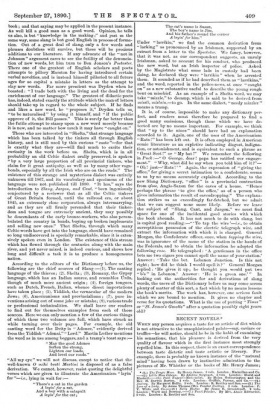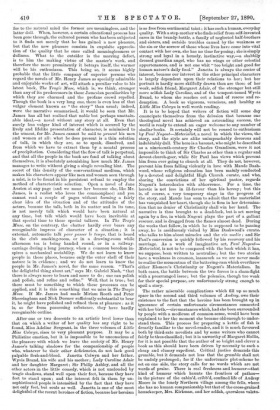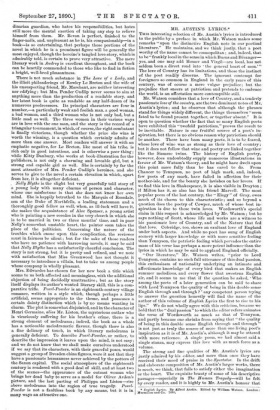RECENT NOVELS.* WHEN any person acquires a taste for an
article of diet which is not attractive to the unsophisticated palate—say, caviare or truffles—he will notice, should he be in the habit of examining his sensations, that his pleasure is derived from the very quality of flavour which in the first instance moat strongly repelled him. In this respect, there is an exact correspondence between taste dietetic and taste artistic or literary. For example, there is probably no known instance of the "natural mind" having been drawn by instinctive admiration to the pictures of Mr. Whistler or the books of Mr. Henry James ;
• (1.) The Tragic Muse. By Henry James. 3 vols. London Macmillan and Co. —(2.) Little Miss Colwyn. By Adeline Sergeant. S vols. London : Hurst and Blackett.—(3.) Paul Nugent—Materialist, By Helen Hetherington and the Rev. H. Darwin Barton. 2 vole. London Grifilth, Ferran. and 00.—(4.) Audrey. By Margaret Hollis. 3 vole. London : B.. Bentley and Bon.—(5) The- Love of a Lady. By Annie Thomas (Mrs. Ponder Catnip). 3 vols. London : F. v. White and Co.—(6.) Nelly Blythe By Jessie B. Greenwood. 2 vole. London : Ward and Downey.—17.) Pearl-Powder. By Mrs. Annie Rdwardes, 2 yob. London : H. Bentley and Son. for to the natural mind the former are meaningless, and the latter dull. When, however, a certain educational process has been gone through, the cultured person who has been subjected to it finds not merely that he has gained a new pleasure, but that the new pleasure consists in exquisite apprecia- tion of the quality that he once called meaninglessness or dullness. What to the outsider is the marring defect, is to him the making virtue of the master's work, and therefore the more prominently it betrays itself, the warmer will be his enthusiasm. This being so, it seems highly probable that the little company of superior persons who regard the novels of Mr. Henry James as specially admirable and enjoyable works of art, will attach a peculiar value to his latest book, The Tragic Muse, which is, we think, stronger than any of its predecessors in those Jamesian peculiarities by which they are charmed and the profane crowd repelled. Though the book is a very long one, there is even lees of that vulgar element known as "the story" than usual; indeed, were the narrative summarised, it would be seen that Mr. James has all but realised that noble but perhaps unattain- able ideal,—a novel without any story at all. Even that surely less vulgar kind of interest which is secured by the lively and lifelike presentation of character, is minimised to the utmost, for Mr. James cannot be said to present his men and women at all : what he does present is a thin solution of talk, in which they are, so to speak, dissolved, and from which we have to extract them by a mental process of precipitation. Considering that the flow of talk is perpetual, and that all the people in the book are fond of talking about themselves, it is absolutely astonishing how much Mr. James manages to write without giving a single revealing hint. The secret of this density of the conversational medium, which makes his characters appear like men and women seen through a mist, is to be found in his persistent refusal to employ the method of characteristic selection. Open a novel of Jane Austen at any page (and we name her because she, like Mr. James, is a realist who loves the commonplace) and you cannot read a couple of pages without forming a fairly clear idea of the situation and of the attitudes of the actors, because the talk, both in its matter and in its tone, is not merely talk which would have been natural at any time, but talk which would have been inevitable at that special time to those special talkers. In The Tragic Muse, on the contrary, the chatter hardly ever bears any recognisable impress of character of a situation ; it is external, automatic talk pour passer is temps, that is heard in the club smoking-room, or in a drawing-room while afternoon tea is being handed round, or in a railway- carriage during a long journey, when a common boredom in- spires a mechanical sociability. We do not learn to know people in these places, because only the outer shell of their nature is in evidence ; and we do not learn to know the people in Mr. James's novel, for the same reason. "That's the delightful thing about art," says Mr. Gabriel Nash, "that there is always more to learn and more to do ; one can polish and polish, and refine and refine." Well, that is true ; but there must be something to which these processes can be applied, and it is this something that we miss in The Tragic Muse. If Mr. James had made Miriam Rooth and Peter Sheriingham and Nick Dormer sufficiently substantial to bear it, he might have polished and refined them at pleasure : as it is, so far from possessing substance, they have hardly recognisable outline.
After one or two descents to an artistic level lower than that on which a writer of her quality has any right to be found, Miss Adeline Sergeant, in the three volumes of Little Miss Colwyn, rises to very pleasant purpose. It may be a Philistine emotion, but it is impossible to be unconscious of the pleasure with which we leave the society of Mr. Henry James's talking shadows for the companionship of people who, whatever be their other deficiencies, do not lack good palpable flesh-and-blood. Janetta Colwyn and her father, W3rvis Brand, his wife and his mother; Lady Caroline Adair and her daughter Margaret ; Sir Philip Ashley, and all the other actors in the little comedy, which is not unclouded by tragic shadows, stand well upon their feet, because they have feet to stand upon ; and the interest felt in them by un- sophisticated people is intensified by the fact that they have not only feet, but souls as well. Janetta is one of the most delightful of the recent heroines of fiction, because her heroism is so free from sentimental taint ; it has such a human, everyday quality. With a step-mother who finds relief from self-invented cares in the brandy-bottle, a family of neglected half-brothers and sisters, and outside troubles caused by the weakness or the sin or the sorrow of those whose lives have come into vital contact with her own, she has no time for posing ; she is simply strong and loyal in a homely, instinctive way,—a shabbily dressed guardian angel, who has no wings or other celestial appurtenances, and is not one whit "too bright and good for human nature's daily food." Janetta is always the centre of interest, because our interest in the other principal characters is largely dependent upon their relations to her; but her portrait is hardly more skilfully drawn than are those of her weak, selfish friend, Margaret Adair, of the stronger but still more selfish Lady Caroline, and of the tempest-tossed Wyvis Brand, to whom she reaches out a hand of rescue and re- demption. A book so vigorous, veracious, and healthy as Little Miss Colwyn is well worth reading.
It is to be hoped that writers of fiction will some day emancipate themselves from the delusion that because one theological novel has achieved an astounding success, the world is ready to extend an eager welcome to any number of similar books. It certainly will not be roused to enthusiasm by Paul Nugent—Materialist, a novel in which the views, the
story, and the style are alike unimpeachably decorous and indubitably dull. The hero is a baronet, who might be described
as a nineteenth-century Sir Charles Grandison, were it not impossible to think of Sir Charles as other than a regular and devout church-goer, while Sir Paul has views which prevent him from ever going to church at all. They do not, however, prevent him from falling violently in love with Maude Dash- wood, whose religions education has been mainly conducted by a devoted and delightful High Church curate, and who, sharing the convictions of her spiritual pastor, regards Nugent's heterodoxies with abhorrence.. For a time, the heretic is not less in ill-favour than his heresy; but this is, of course, a very temporary stage in the progress of the story, and Maude has soon to admit that the materialist has vanquished her heart, though she is firm in her determina- tion that no denier of Christianity shall win her hand. The narrative is thus brought to a dead-lock, but is set moving again by a fire, in which Nugent plays the part of a gallant rescuer, and is dragged from the flames almost dead. During the weeks that follow, in which he is supposed to be passing away, he is assiduously visited by Miss Dashwood's curate, who talks to him about miracles and the via media ; and Sir Paul's conversion is quickly followed by his recovery and his marriage. As a work of imaginative art, Paul Nugent— Materialist, is not to be compared with the book which it has, we suppose, been written to neutralise ; but the two stories have a weakness in common, inasmuch as we are never made to realise the momentum of the battering-ram which overthrew either Elsmere's Christianity or Nugent's Materialism. In both cases, the battle between the two forces is a sham-fight with a prearranged issue ; but the polemics, though too weak for their special purpose, are unfortunately strong enough to spoil a story.
The rather miserable complications which fill up so much space in the second and third volumes of Audrey, owe their existence to the fact that the heroine has been- brought up in ignorance of certain unfortunate circumstances connected with her birth,—circumstances which, had she been surrounded by people with a modicum of common-sense, would have been explained to her the moment she became old enough to under- stand them. This process for preparing a kettle of fish is drearily familiar to the novel-reader, and it is much favoured both by third-rate novelists and by some writers who cannot fairly be thus classified ; but it is unworthy of Margaret Hollis, for it is not possible that the author of so bright and clever a book as this should have been driven by necessity to such a cheap and clumsy expedient. Critical justice demands this grumble, but it demands not less that the grumble shall not be unduly prolonged ; for if the unfortunate plot-scheme be set on one side, the story calls for no words which are not words of praise. There is real freshness and humour—that kind of humour which haunts the frontiers of pathos— in the picture of the cabin'd, cribb'd, confined life of Audrey Moore in the lonely Northern village among the fells, where she has no human companionship but that of the cross-grained housekeeper, Mrs. Kirkman, and her selfish, querulous valetu- dinarian guardian, who hates his responsibilities, but hates still more the mental exertion of taking any step to relieve himself from them. Mr. Bevan is perfect, finished to the finger-nails, and, unpleasant as he is, his companionship—in a book—is so entertaining, that perhaps those portions of the novel in which he is a prominent figure will be generally the most enjoyed, though the heroine's tangled love-story, which is admirably told, is certain to prove very attractive. The mere literary work in Audrey is excellent throughout, and the book can be heartily commended to those who like to find in fiction a bright, well-bred pleasantness.
There is not much substance in The Love of a Lady, and the illicit philanderings of Rowley Le Breton and the wife of his unsuspecting friend, Mr. Marchant, are neither interesting nor edifying ; but Mrs. Pender Cudlip never seems to aim at anything more than the production of a readable story, and her latest book is quite as readable as any half-dozen of its numerous predecessors. Its principal characters are four in number,—a particularly weak and. foolish man, a good woman, a bad woman, and a third woman who is not only bad, but a little mad as well. The three women in their various ways are in love with the one man, and the story is the record of a triangular tournament, in which, of course, the right combatant is finally victorious, though whether the prize she wins is worth the winning, is a question which certainly admits of more than one answer. Most readers will answer it with an emphatic negative, for Le Breton, like most of his tribe, is rich only in good intentions, and is otherwise a poor thing ; while Kitty Danbury, who works at book-illustration for the publishers, is not only a charming and loveable girl, but a strong and capable girl as well. She is certainly by far the most attractive of Mrs. Pender Cudlip's heroines, and she serves to give to the novel a certain elevation in which, apart from her, it is altogether deficient.
, Neill Blythe is the slight but very gracefully told story of a young lady with many charms of person and character, whose one misfortune is that she does not know her own mind. She is happily betrothed to the Marquis of Rosedale, son of the Duke of Northfells, a leading statesman and a thoroughly good fellow as well, when, as ill-luck will have it, she makes the acquaintance of Alec Spenser, a young artist who is painting a new reredos in the very church in which she is to be married in two or three months' time, and in poor Nelly's somewhat unstable heart, the painter soon takes the place of the politician. Concerning the nature of the troubles which ensue upon this complication, the reviewer must in fairness be silent; but for the sake of those readers who have no patience with harrowing novels, it may be said that Nelly Blythe has a satisfactorily cheerful conclusion. The story is not strong, but it is pretty and refined, and we note with satisfaction that Miss Greenwood has not thought it necessary to introduce a villain, but to take us among people whose company is wholly pleasant.
Mrs. Edwardes has chosen for her new book a title which seems to us both affected and meaningless, with the additional objection of being decidedly unattractive ; but as the story itself displays its author's wonted literary skill, this is a com- parative trifle. Pearl-Powder is an eighteenth-century village romance, written in a style which, though perhaps a little artificial, seems appropriate to the theme, and possesses a certain dainty distinction which is by no means wanting in charm. The plot is somewhat disjointed, and in the character of Hemi Germaine, alias Mr. Liston, the mysterious outlaw who is vicariously suffering for his brother's crime, there is a strong element of melodrama; indeed, the book as a whole has a noticeable melodramatic flavour, though there is also a fine delicacy of touch, in which literary melodrama is generally deficient. To describe Pearl-Powder, or rather, to describe the impression it leaves upon the mind, is not easy; and we do not know that we shall make ourselves understood if we say that its characters, with their graceful poses, would suggest a group of Dresden china figures, were it not that they have a passionate humanness never achieved by the potters of the Saxon capital. The social atmosphere of the eighteenth century is rendered with a good deal of skill, and at least two of the scenes—the appearance of the outcast woman who brings her dead baby to serve as a model for Oliver Arden's picture, and the last parting of Philippa and Liston—rise above melodrama into the region of true tragedy. Pearl- Powder is not a faultless book by any means, but it is in many ways an attractive one.




































 Previous page
Previous page